Mises, Ludwig von. Human Action: A Treatise on Economics
Подождите немного. Документ загружается.

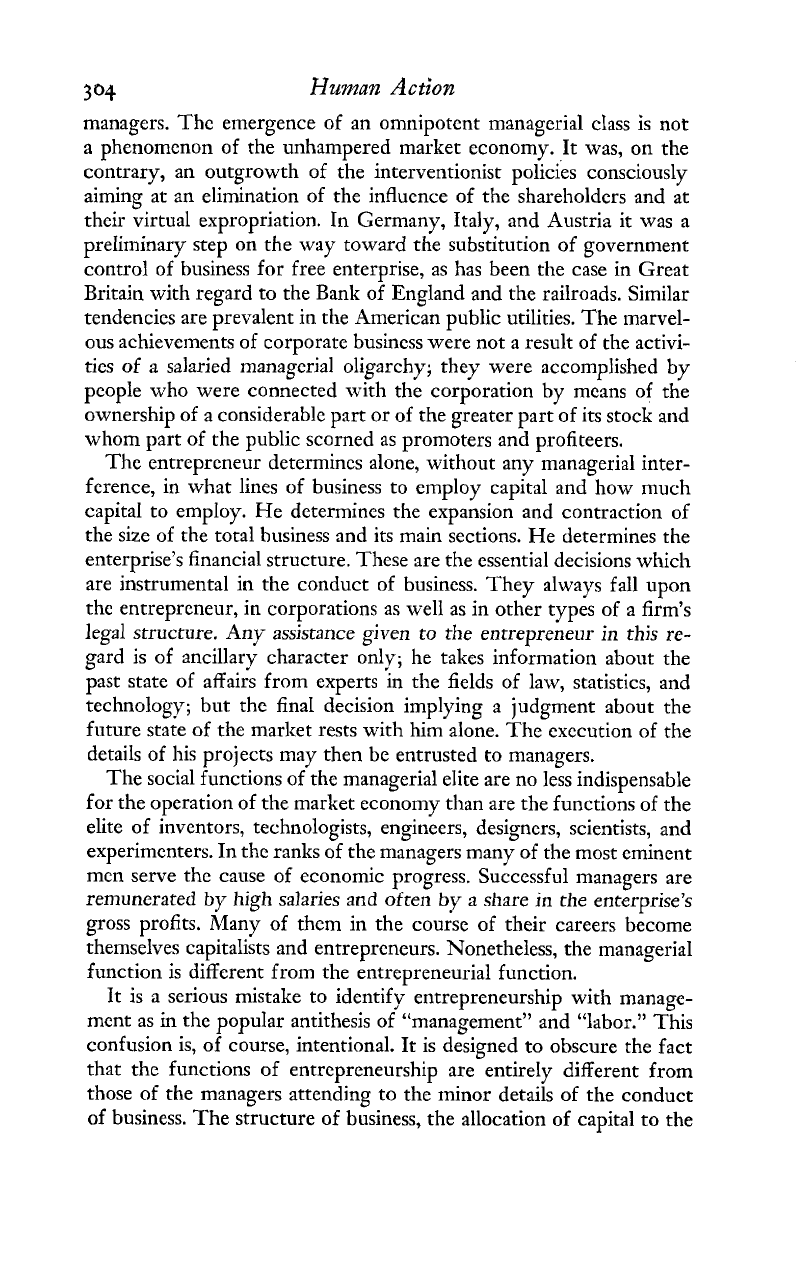
304
Human
Action
managers. Thc emergence of an omnipotent managerial class is not
a
phenomenon of the unhampered market economy. It was, on the
contrary, an outgrowth of the interventionist policies consciously
aiming at an elimination of the influence of the shareholders and at
thcir virtual expropriation. In Germany, Italy, and Austria it was a
preliminary step on the way toward the substitution of government
control of business for free enterprise, as has been the case in Great
Britain with regard to the Bank of England and the railroads. Similar
tendencies are prevalent in the American public utilities. The marvel-
ous achievements of corporate business were not a result of the activi-
tics
of
a salaried managcrjal oligarchy; they were accomplished by
people who were connected with the corporation by means of the
ownership of a considerable part or of the greater part of its stock and
whom part of the public scorned as promoters and profiteers.
The entreprcneur determincs alone, without any managerial inter-
ference, in what lines of business to employ capital and how much
capital to employ. He determines the expansion and contraction of
the size of the total business and its main sections. He determines the
enterprise's financial structure. These are the essential decisions which
are instrumental in the conduct of business. They always fall upon
the entreprcneur, in corporations as well as in other types of
a
firm's
legal structure. Any assistance given to the entrepreneur in
this
re-
gard is of ancillary character only; he takes information about the
past state of affairs from experts in the fields of law, statistics, and
technology; but the finaI decision implying a judgment about the
future state of the market rests with him alone. The execution of the
details of his projects may then be entrusted to managers.
The social functions of the managerial elite are no less indispensable
for the operation of the market economy than are the functions of the
elite of inventors, technologists, engineers, designers, scientists, and
experimcnters. In the ranks of the managers many of the most eminent
mcn serve the cause of economic progress. Successful managers are
remunerated by high salaries and often by a share
in
the enterprise's
gross profits. Many of them in the couise of their careers become
themselves capitalists and entrepreneurs. Nonetheless, the managerial
function is different from the entrepreneurial function.
It is a serious mistake to identify entrepreneurship with manage-
ment as in the popular antithesis of "management" and "labor." This
confusion is, of course, intentional. It is designed to obscure the fact
that the functions of entrcpreneurship are entirely different from
those of the managers attending to the minor details of the conduct
of
business. The structure of business, the allocation of capital to the
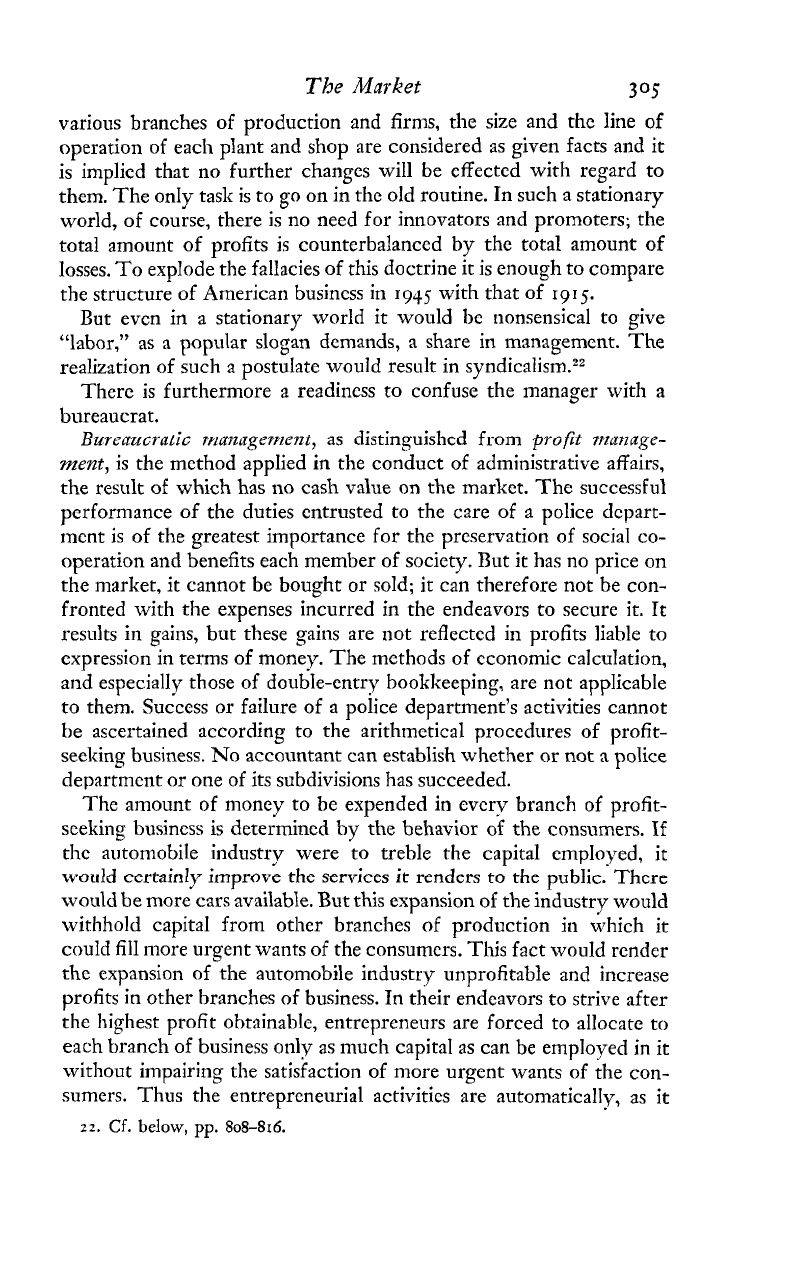
The
Market
various branches of production and firms, the size and the line of
operation of each plant and shop are considered as given facts and it
is implied that no further changes will be effected with regard to
them. The onIy task is to go on in the oid routine. In such a stationary
world, of course, there is no need for innovators and promoters; the
total amount of profits is counterbalanced by the total amount of
losses. To explode the fallacies of this doctrine it is enough to compare
the structure of American business in
I
945
with that of
191
5.
But even in a stationary world it would be nonsensical to give
"labor," as a popular slogan demands, a share in management.
The
realization of such a postulate would result in syndi~alism.~~
There is furthermore a readiness to confuse the manager with a
bureaucrat.
Burcnucratic
management,
as distinguished from
pofit
manage-
ment,
is the method applied in the conduct of administrative affairs,
the result of which has no cash value on the market. The successful
performance of the duties entrusted to the care of a police depart-
ment is of the greatest importance for the preservation of social co-
operation and benefits each member of society. But it has no price on
the market, it cannot be bought or sold; it can therefore not be con-
fronted with the expenses incurred in the endeavors to secure it. It
results in gains, but these gains are not reflected in profits liable to
expression in terms of money. The methods of economic calculation,
and especially those of double-entry bookkeeping, are not applicable
to them. ~u&ess or failure of a department's activities cannot
be ascertained according to the arithmetical procedures of profit-
seeking business. No accountant can establish whether or not
a
police
department or one of its subdivisions has succeeded.
The amount of money to he expended in every branch of profit-
seeking business is determined by the behavior
of
the consumers.
Tf
the automobile industry were to treble the capital employed, it
would certainly improve the services it renders to the public.'There
would be more cars available. But this expansion of the industry would
withhold capital from other branches of production
in
which it
could fill more urgent wants of the consumers. This fact would render
the expansion of the automobile industry unprofitable and increase
profits in other branches of business. In their endeavors to strive after
the highest profit obtainable, entrepreneurs are forced to allocate to
each branch of business only as much capital as can be employed in it
without impairing the satisfaction of more urgent wants of the con-
sumers. Thus the entrepreneurial activities are automatically, as it
22.
Cf.
below,
pp.
808-816.
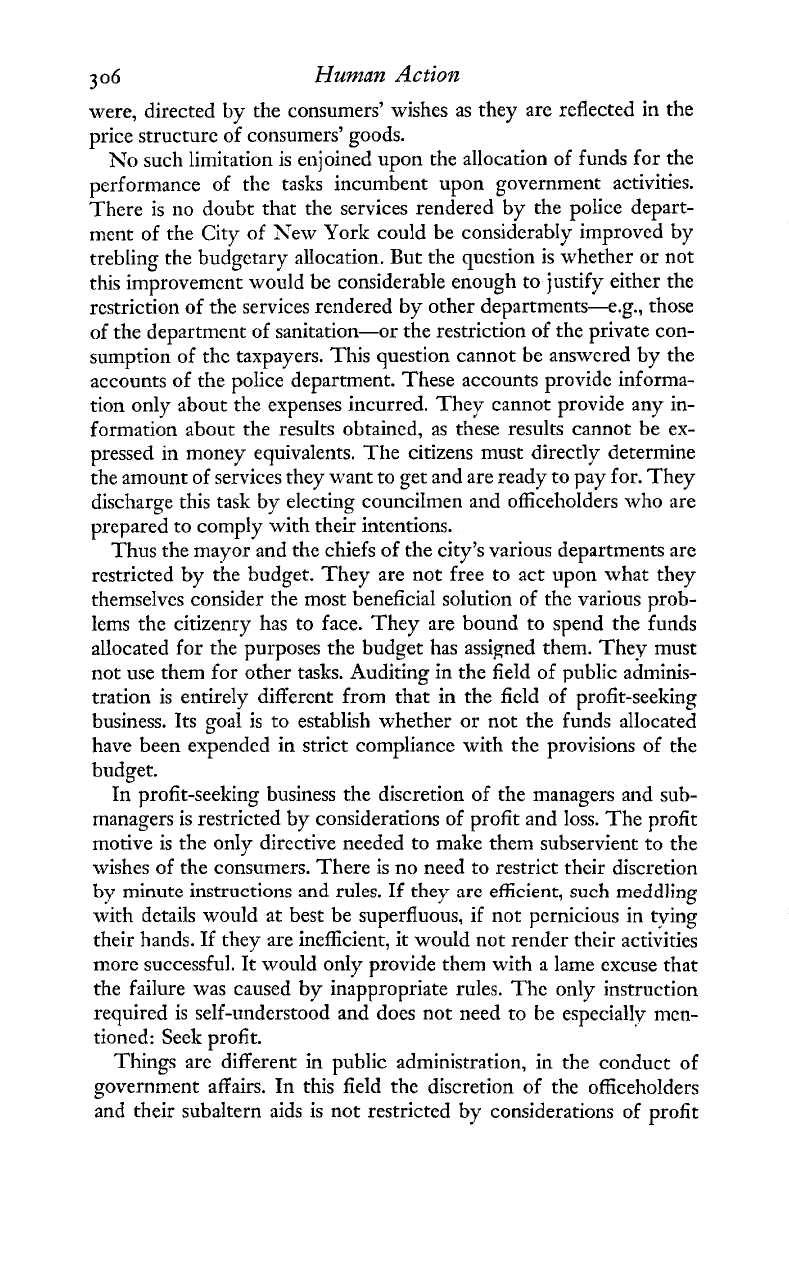
306
Human
Action
were, directed by the consumers' wishes as they are reflected in the
price structure of consumers' goods.
No such limitation is enjoined upon the allocation of funds for the
performance of the tasks incumbent upon government activities.
There is
no
doubt that the services rendered by the police depart-
ment of the City of Sew York could be considerably improved by
trebling the budgetary allocation. But the question is whether or not
this improvement would be considerable enough to justify either the
restriction of the services rendered by other departments-e.g., those
of the department of sanitation-or the restriction of the private con-
sumption of the taxpayers. This question cannot be answered by the
accounts of the police department. These accounts provide informa-
tion only about the expenses incurred. They cannot provide any in-
formation about the results obtained, as these results cannot be ex-
pressed in money equivalents. The citizens must directly determine
the amount of services they want to get and are ready to pay for. They
discharge this task by electing councilmen and officeholders who are
prepared to comply with their intentions.
Thus the mayor and the chiefs of the city's various departments are
restricted by the budget. They are not free to act upon what they
themselves consider the most beneficial solution of the various prob-
lems the citizenry has to face. They are bound to spend the funds
allocated for the purposes the budget has assigned them. They must
not use them for other tasks. Auditing in the field of public adminis-
tration is entirely different from that in the field of profit-seeking
business. Its goal is to establish whether or not the funds allocated
have been expended in strict compliance with the provisions of the
budget.
In profit-seeking business the discretion of the managers and sub-
managers is restricted by considerations of profit and loss. The profit
motive is the only directive needed to make them subservient to the
wishes of the consumers. There is no need to restrict their discretion
by
mi~ute instructinns
and
mks.
If
thev
arc
efiicient,
such
zedd!in-
5
with details would at best be superfluous, if not pernicious in tving
their hands. If they are inefficient, it would not render their actiiities
more successful. It would only provide them with a lame excuse that
the failure was caused by inappropriate rules. The only instruction
required is self-understood and does not need to
be
especiallv men-
tioned: Seek profit.
Things are different in public administration, in the conduct of
government affairs. In this field the discretion of the officeholders
and their subaltern aids is not restricted by considerations of profit
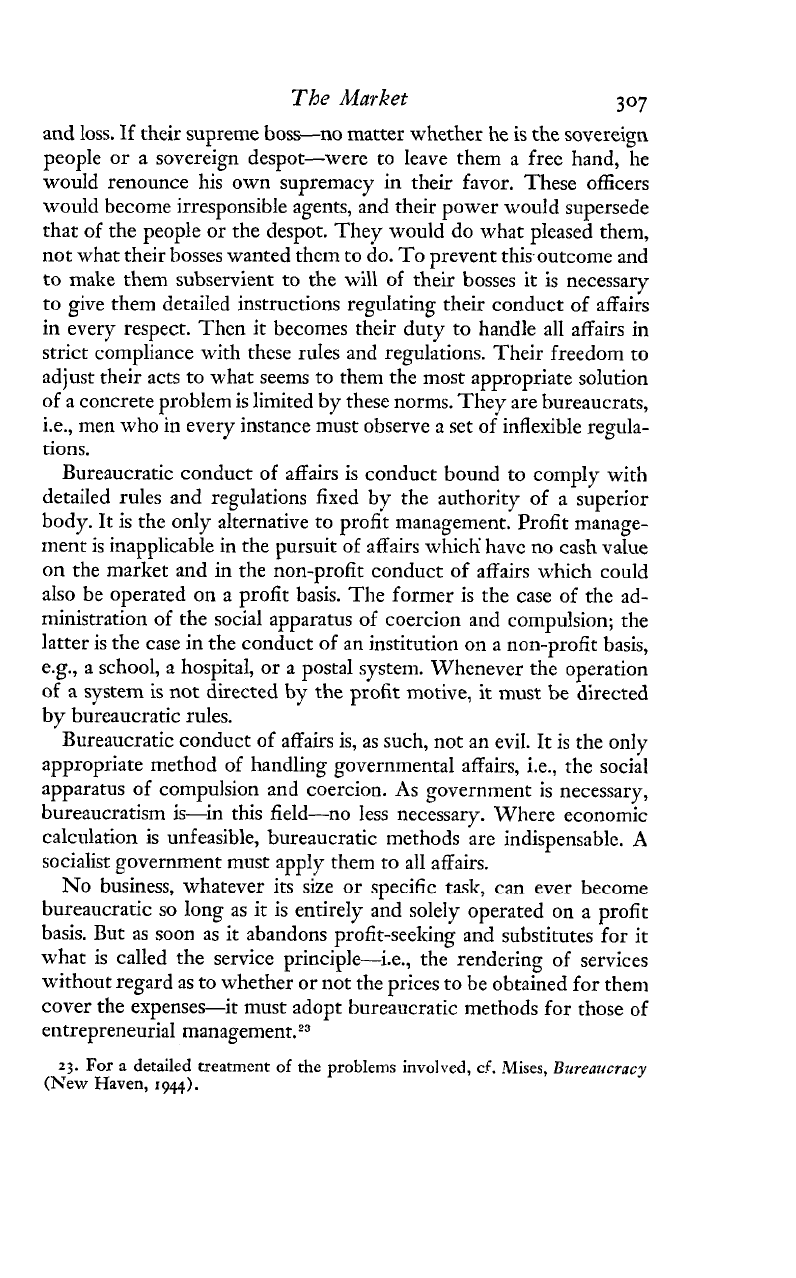
The
Market
and loss. If their supreme boss-no matter whether
he
is
the sovereign
people or a sovereign despot-were to leave them a free hand, he
would renounce his own supremacy in their favor. These officers
would become irresponsible agents, and their power would supersede
that of the ~eople or the despot. They would do what pleased them,
not what their bosses wanted them to do. To prevent thisoutcome and
to make them subservient to the
will
of
their bosses it is necessary
to give them detailed instructions regulating their conduct of affairs
in every respect. Then it becomes their duty to handle all affairs in
strict compliance with these ruIes and regulations. Their freedom to
adjust their acts to what seems to them the most appropriate solution
of a concrete problem is limited by these norms. They are bureaucrats,
i.e., men who in every instance must observe a set of inflexible regula-
tions.
Bureaucratic conduct of affairs is conduct bound to comply with
detailed rules and regulations fixed by the authority of a superior
body. It is the only alternative to profit management. Profit manage-
ment is inapplicable in the pursuit of affairs whicli have no cash value
on the market and in the non-profit conduct of affairs which could
also be operated on a profit basis. The former is the case of the ad-
n~inistration of the social apparatus of coercion and compulsion; the
latter is the case in the conduct of an institution on a non-profit basis,
e.g., a school, a hospital, or a postal system. Whenever the operation
of
a
system is not directed
by
the profit motive, it must be directed
by bureaucratic rules.
Bureaucratic conduct of affairs is, as such, not an eviI. It is the only
appropriate method of handling governmental affairs, i.e., the social
apparatus of compulsion and coercion. As government is necessary,
bureaucratism is-in this field-no less necessary. Where economic
calculation is unfeasible, bureaucratic methods are indispensable.
A
socialist government must apply them to all affairs.
No business, whatever its size or specific task, can ever become
bureaucratic so long as it is entirely and solely operated on a profit
basis. But as soon as it abandons profit-seeking and substitutes for it
what is called the service principle-ie., the rendering of services
without regard as to whether or not the prices to be obtained for then1
cover the expenses-it must adopt bureaucratic methods for those of
entrepreneurial
manage men^^^
23.
For
a detailed treatment
of
the problems
involved,
cf.
Mises,
Bureaircracy
(New Haven,
I
944).
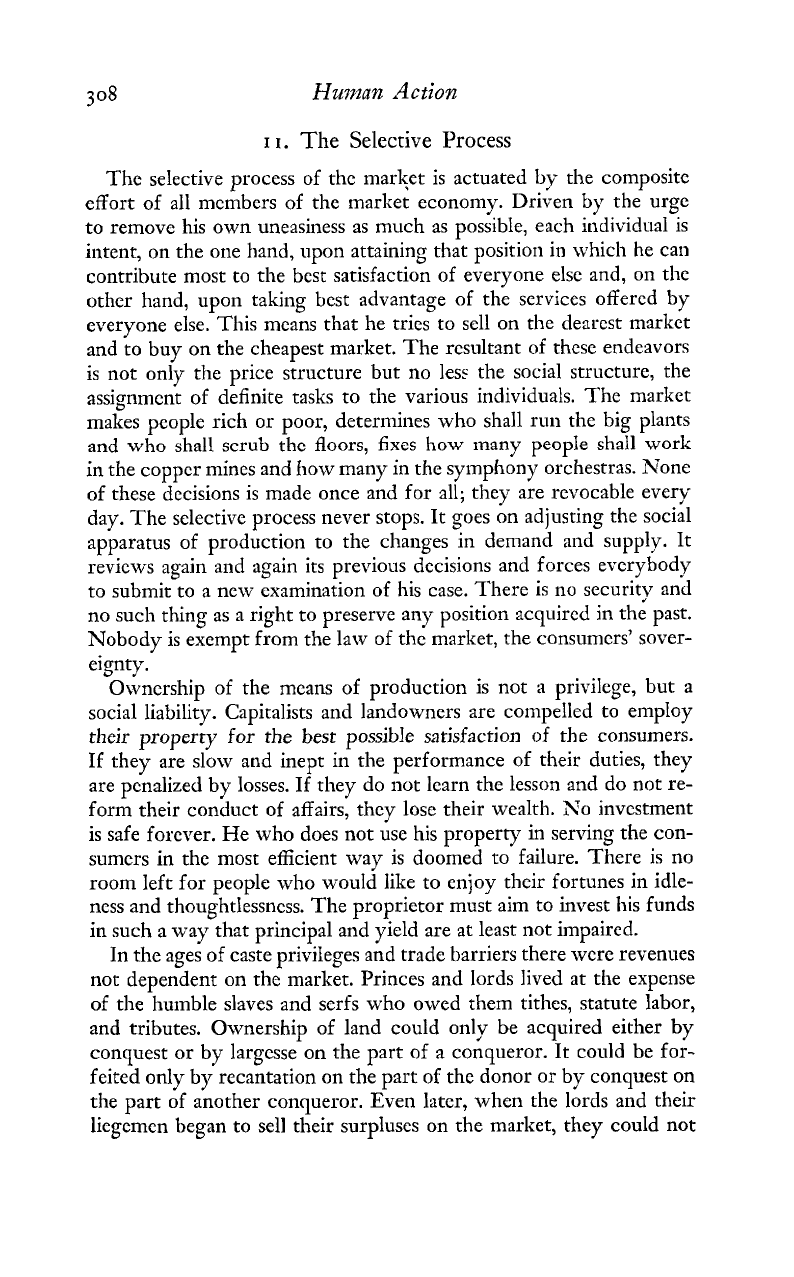
308
Human
Action
I
I.
The
Selective Process
The selective process of the market is actuated by the composite
effort of all members of the market economy. Driven by the urge
to remove his own uneasiness as much as possible, each individual is
intent, on the one hand, upon attaining that position in which he can
contribute most to the best satisfaction of everyone else and, on the
other hand, upon taking best advantage of the services offered by
everyone else. This means that he tries to sell on the dearest market
and to buy on the cheapest market. The resultant
of
these endeavors
is not only the price structure but no less the social structure, the
assignment of definite tasks to the various individuals. The market
makes people rich or poor, determines who shall run the big plants
and who shall scrub the floors, fixes how many peopIe shall work
in the copper mines and how many in the symphony orchestras. None
of these dccisions is made once and for all; they are revocable every
day. The selective process never stops. It goes on adjusting the social
apparatus of production to the changes in demand and supply. It
reviews again and again its previous decisions and forces everybody
to submit to a new examination of his case. There is no security and
no such thing as a right to preserve any position acquired in the past.
Nobody is exempt from the law of the market, the consumers' sover-
eignty.
Ownership of the means of production is not
a
privilege, but a
social liability. Capitalists and landowners are compelled to employ
their property for
the
best possible sarjsfaction of the consumers.
If they are slow and inept in the performance of their duties, they
are penalized by losses. If they do not learn the lesson and do not re-
form their conduct of affairs, they lose their wealth. No investment
is safe forever. He who does not use his property in serving the con-
sumers in the most efficient way is doomed to failure. There is no
room left for people who would like to enjoy their fortunes in idle-
ness and thoughtIessness. The proprietor must aim to invest his funds
in such a way that principal and yield are at least not impaired.
In the ages of caste privileges and trade barriers there were revenues
not dependent on the market. Princes and lords lived at the expense
of the humble slaves and serfs who owed them tithes, statute labor,
and tributes. Ownership of land could only be acquired either by
conquest or by largesse on the part of a conqueror. It could be for-
feited only by recantation on the part of the donor or by conquest on
the part of another conqueror. Even later, when the lords and their
liegemen began to sell their surpluses on the market, they could not
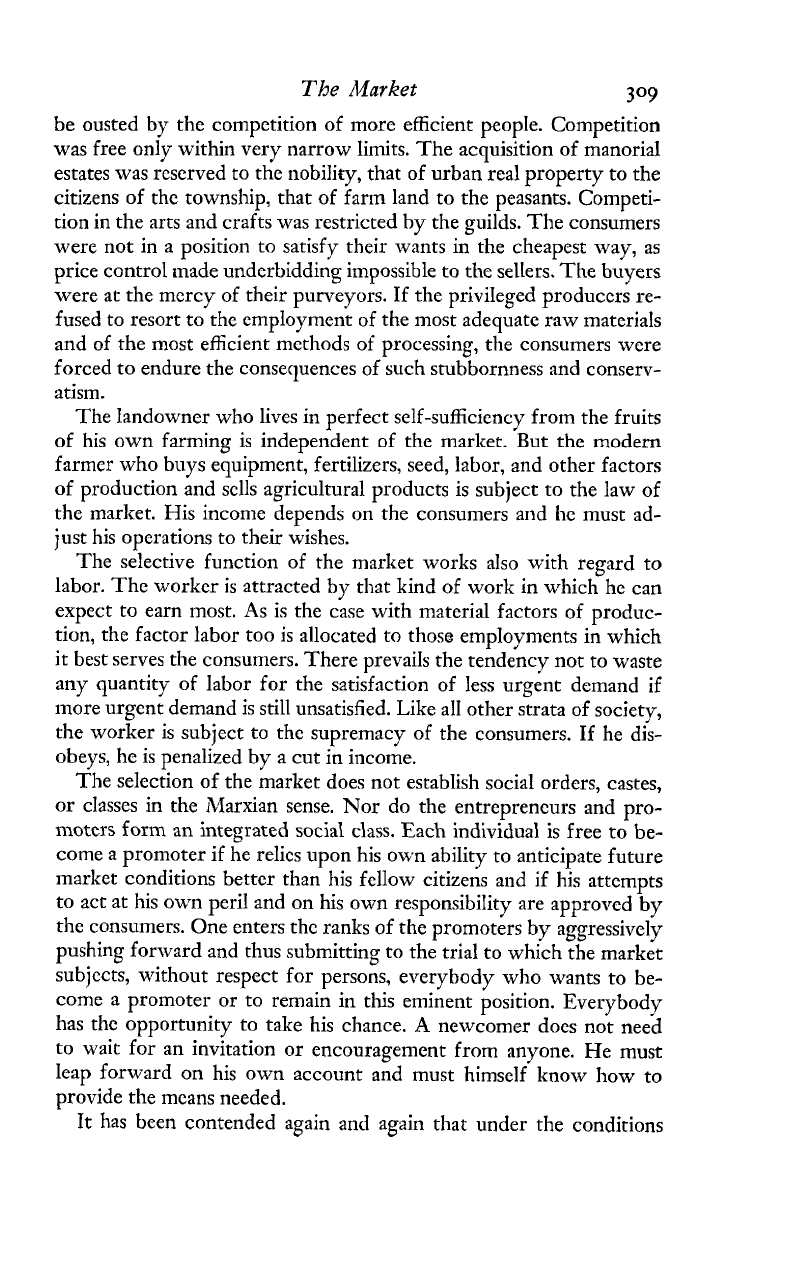
The
Market
309
be ousted by the competition of more efficient people. Competition
was free only within very narrow limits. The acquisition of manorial
estates was reserved to the nobility, that of urban real property to the
citizens of the township, that of farm land to the peasants. Competi-
tion in the arts and crafts was restricted by the guilds. The consumers
were not in a position to satisfy their wants in the cheapest way, as
price control made underbidding impossible to the sellers. The buyers
were at the mercy of their purveyors. If the privileged producers re-
fused to resort to the employment of the most adequate raw materials
and of the most efficient methods of processing, the consumers were
forced to endure the consequences of such stubbornness and conserv-
atism.
The landowner who lives in perfect self-sufficiency from the fruits
of his own farming is independent of the market. But the modern
farmer who buys equipment, fertilizers, seed, labor, and other factors
of production and sells agricultural products is subject to the law of
the marltet. His income depends on the consumers and
he
must ad-
just his operations to their wishes.
The selective function of the market works also with regard to
labor. The worker is attracted by that kind of work in which he can
expect to earn most. As is the case with material factors of produc-
tion, the factor labor too is allocated to those employments in which
it
best serves the consumers. There prevails the tendency not to waste
any quantity of labor for the satisfaction of less urgent demand
if
more urgent demand is still unsatisfied. Like a11 other strata of society,
the worker is subject to the supremacy of the consumers. If he dis-
obeys, he is penalized by a cut in income.
The selection of the market does not establish social orders, castes,
or classes in the Marxian sense. Nor do the entrepreneurs and pro-
moters form an integrated social class. Each individual is free to be-
come a promoter if he relies upon his own ability to anticipate future
marltet conditions better than his fellow citizens and if his attempts
to act at his own peril and on his own responsibility are approved by
the consumers. One enters the ranks of the promoters by aggressively
pushing forward and thus submitting to the trial to which the market
subjects, without respect for persons, everybody who wants to be-
come a promoter or to remain in this eminent position. Everybody
has the opportunity to take his chance.
A
newcomer does not need
to wait for an invitation or encouragement from anyone. He must
leap forward on his own account and must himself know how to
provide the means needed.
It has been contended again and again that under the conditions
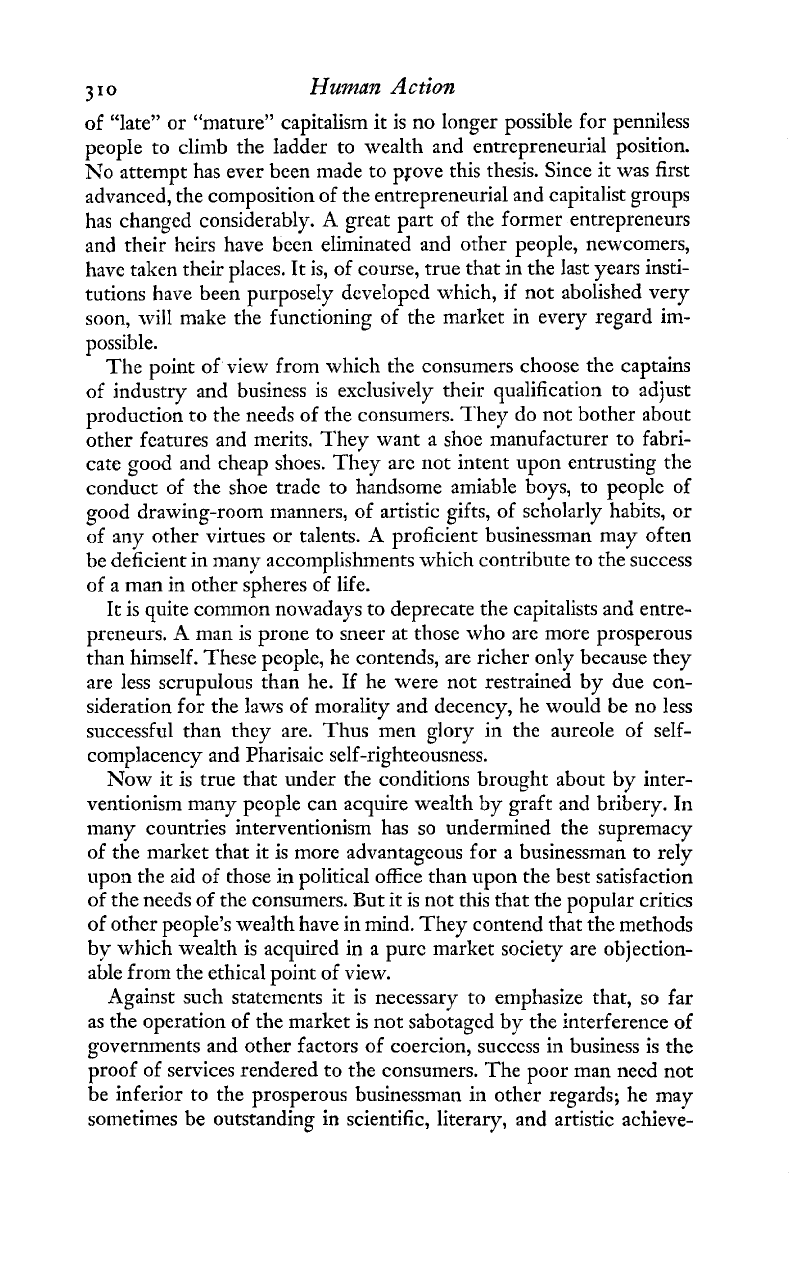
310
Human
Action
of "late" or "mature" capitalism it is no longer possible for penniless
people to climb the ladder to wealth and entrcpreneurial position.
No attempt has ever been made to prove this thesis. Since it was first
advanced, the composition of the entrepreneurial and capitalist groups
has changed considerably.
A
great part of the former entrepreneurs
and their heirs have been eliminated and other people, newcomers,
have taken their places. It is, of course, true that in the last years insti-
tutions have been purposely developed which, if not abolished very
soon, will make the functioning of the market in every regard im-
possible.
The point of view from which the consumers choose the captains
of industry and business is exclusively their qualification to adjust
production to the needs of the consumers. They do not bother about
other features and merits. They want a shoe manufacturer to fabri-
cate good and cheap shoes. They are not intent upon entrusting the
conduct of the shoe trade to handsome amiable boys, to people of
good drawing-room manners, of artistic gifts, of scholarly habits, or
of any other virtues or talents.
A
proficient businessman may often
be deficient in many accomplishments which contribute to the success
of
a man in other spheres of life.
It is quite common nowadays to deprecate the capitalists and entre-
preneurs.
A
man is prone to sneer at those who are more prosperous
than himself. These people, he contends, are richer only because they
are less scrupulous than he. If he were not restrained by due con-
sideration for the laws of morality and decency, he would be no less
successful than they are. Thus men glory in the aureole of self-
complacency and Pharisaic self-righteousness.
Now it is true that under the conditions brought about by inter-
ventionism many people can acquire wealth by graft and bribery. In
many countries interventionism has so undermined the supremacy
of the nlarltet that it is more advantageous for a businessman to rely
upon the aid of those in political office than upon the best satisfaction
of the needs of the consumers. But it is not this that the popuiar critics
of other people's wealth have in mind. They contend that the methods
by which wealth is acquired in a pure market society are objection-
able from the ethical point of view.
Against such statements it is necessary to emphasize that, so far
as the operation of the market is not sabotaged by the interference of
governments and other factors of coercion, success in business is the
proof of services rendered to the consumers. The poor man need not
be inferior to the prosperous businessman in other regards; he may
sometimes be outstanding in scientific, literary, and artistic achieve-
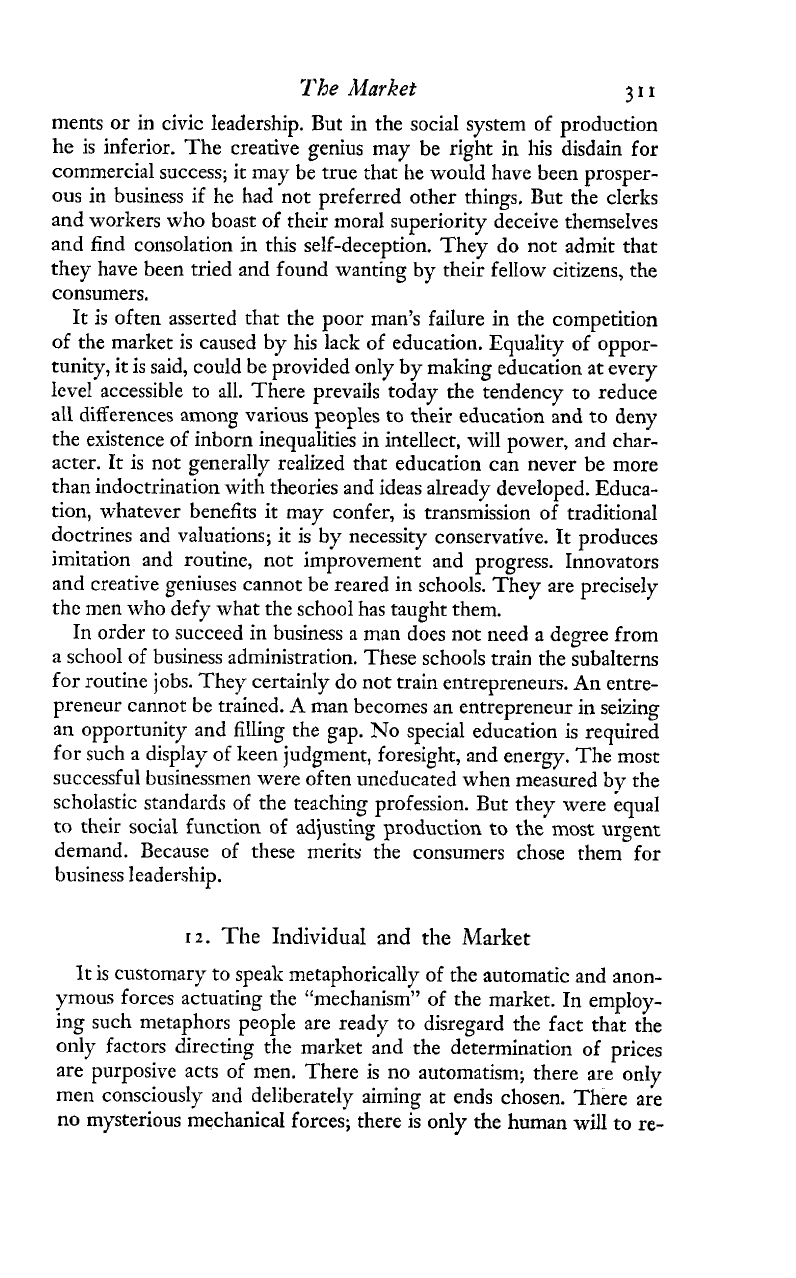
?'he
Market
311
ments or in civic Ieadership. But in the social system of production
he is inferior. The creative genius may be right in his disdain for
commercial success; it may be true that he would have been prosper-
ous in business if he had not preferred other things. But the clerks
and workers who boast of their moral superiority deceive themsehes
and find consolation in this self-deception. They do not admit that
they have been tried and found wanting by their fellow citizens, the
consumers.
It is often asserted that the poor man's failure in the competition
of the market is caused by his lack of education. Equality of oppor-
tunity, it is said, could be provided only by making education at every
level accessible to all. There prevails today the tendency to reduce
all differences among various peoples to their education and to deny
the existence of inborn inequalities in intellect, will power, and char-
acter. It is not generally realized that education can never be more
than indoctrination with theories and ideas already developed. Educa-
tion, whatever benefits it may confer, is transmission of traditional
doctrines and valuations; it is by necessity conservative. It produces
imitation and routine, not improvement and progress. Innovators
and creative geniuses cannot be reared in schools. They are precisely
the men who defy what the school has taught them.
In order to succeed in business a man does not need a degree from
a school of business administration. These schools train the subalterns
for routine jobs. They certainly do not train entrepreneurs. An entre-
preneur cannot be trained.
A
man becomes an entrepreneur in seizing
an opportunity and filIing the gap. No special education is required
for such a display of keen judgment, foresight, and energy. The most
successful businessmen were often uneducated when measured by the
scholastic standards of the teaching profession. But they were
to their social function of adjusting production to the most urgent
demand. Because of these merits the consumers chose them for
business Ieadership.
I
2.
The
IndividuaI
and the Market
It is customary to speak metaphorically of the automatic and anon-
ymous forces actuating the "mechanism" of the market. In employ-
ing such metaphors people are ready to disregard the fact that the
only factors directing the market and the determination of prices
are purposive acts of men. There is no automatism; there are only
men consciously and deliberately aiming at ends chosen. There are
no mysterious mechanical forces; there is only the human will to re-
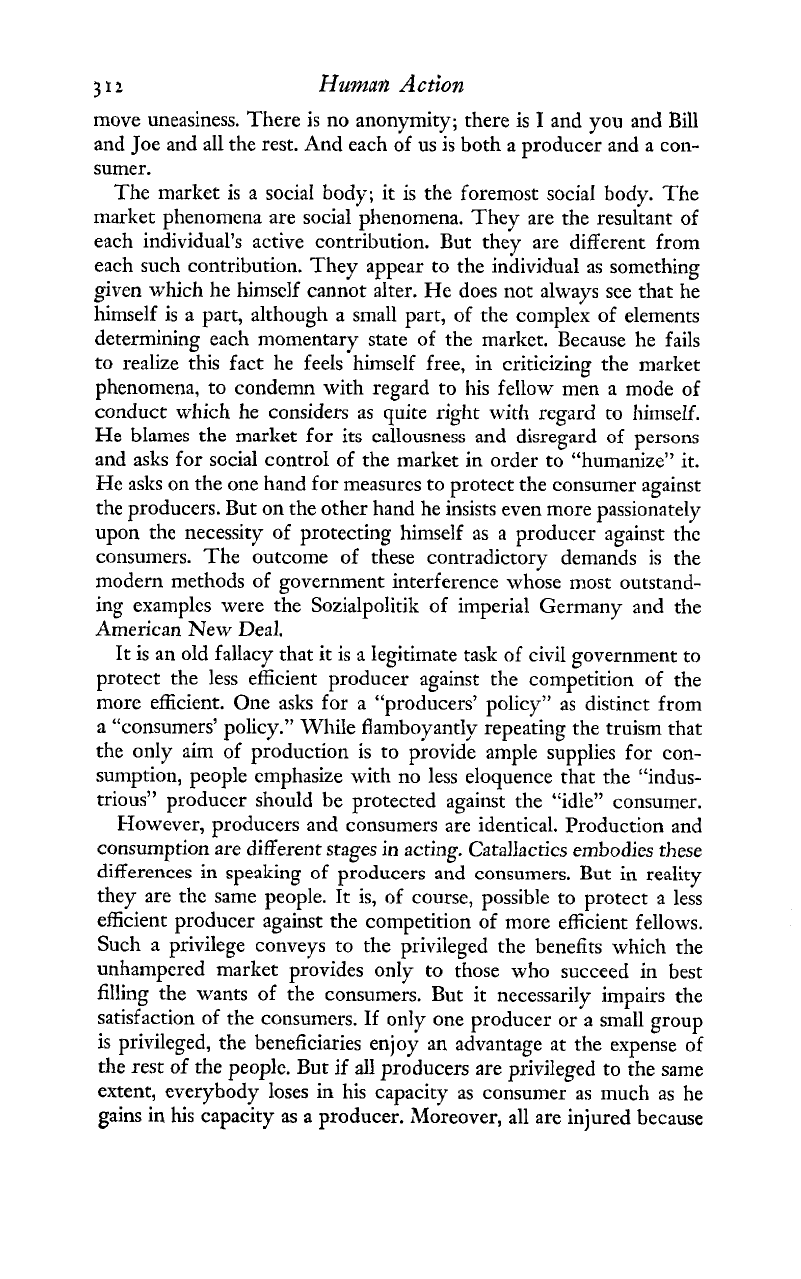
312
Human
Action
move uneasiness. There is no anonymity; there is
I
and you and Bill
and Joe and all the rest. And each of us is both a producer and a con-
sumer.
The market is a social body; it is the foremost social body. The
market phenomena are social phenomena. They are the resultant of
each individual's active contribution. But they are different from
each such contribution. They appear to the individual as something
given which he himsdf cannot alter. He does not always see that he
himself is a part, although a small part, of the complex of elements
determining each momentary state of the market. Because he fails
to realize this fact he feels himself free, in criticizing the market
phenomena, to condemn with regard to his fellow men a mode of
conduct which he considers as quite right with regard to himself.
He
blames the market for its callousness and disregard of persons
and asks for social control of the market in order to "humanize" it.
He asks on the one hand for measures to protect the consumer against
the producers. But on the other hand he insists even more passionately
upon the necessity of protecting himself as a producer against the
consumers. The outcome of these contradictory demands is the
modern methods of government interference whose most outstand-
ing examples were the Sozialpolitik of imperial Germany and the
American New Deal.
It is an old fallacy that it is a legitimate task of civiI government to
protect the less efficient producer against the competition of the
more efficient. One asks for
a
"producers' policy" as distinct from
a "consumers' policy." While flamboyantly repeating the truism that
the only aim of production is to provide ample supplies for con-
sumption, people emphasize with no less eloquence that the "indus-
trious" producer should be protected against the "idle" consumer.
However, producers and consumers are identical. Production and
consumption are different stages in acting. Catallactics embodies these
differences in speaking of producers and consumers. But in reality
they are the same people. It is, of course, possible to protect a less
efficient producer against the con~petition of more efficient fellows.
Such a privilege conveys to the privileged the benefits which the
unhampered market provides only to those who succeed in best
filling the wants of the consumers. But it necessarily impairs the
satisfaction of the consumers. If only one producer or a small group
is privileged, the beneficiaries enjoy an advantage at the expense of
the rest of the people. But if all producers are privileged to the same
extent, everybody loses in his capacity as consumer as much as he
gains in his capacity as a producer.
moreo over,
all are injured because
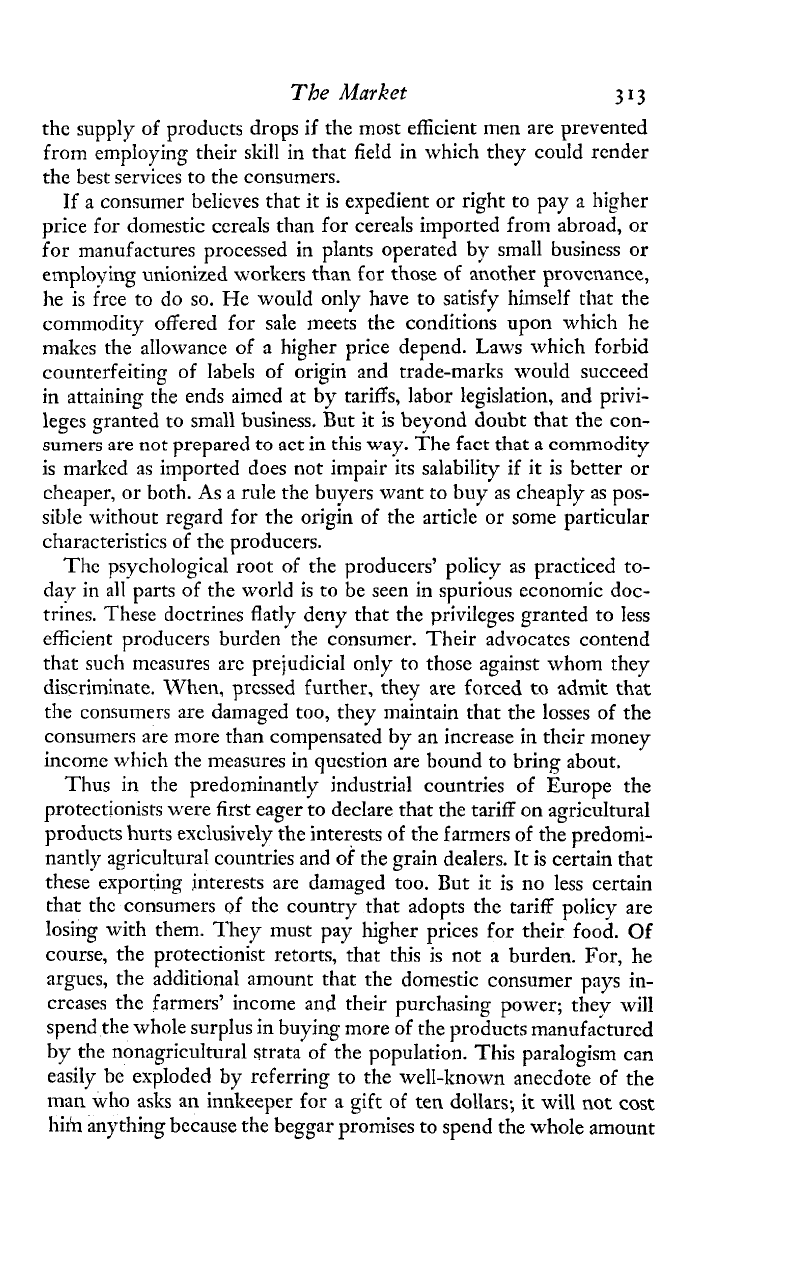
The
Market
313
the supply of products drops if the most efficient men are prevented
from empioying their skill in that field in which they could render
the best services to the consumers.
If a consumer believes that it is expedient or right to pay a higher
price for domestic cereals than for cereals imported from abroad, or
for manufactures ~rocessed in plants operated by small business or
emploving unionized workers than for those of another provenance,
he is free to do so. He would only have to satisfy himself that the
commodity offered for sale meets the conditions upon which he
makes the allowance of a higher price depend. Laws which forbid
counterfeiting of labels of origin and trade-marks would succeed
in attaining the ends aimed at by tariffs, labor legislation, and privi-
leges granted to small business, But it
is
beyond doubt that the con-
sumers are not prepared to act in this way. The fact that a commodity
is marked as imported does not impair its salabiIity if it is better or
cheaper, or both. As a rule the buyers want to buy as cheaply as pos-
sible without regard for the origin of the article or some particular
characteristics of the producers.
The psychological root of the producers' policy as practiced to-
day in alleparts of the world is to be seen in spurious economic doc-
trines. These doctrines flatly deny that the privileges granted to less
efficient producers burden the consumer. Their advocates contend
that such measures are prejudicial only to those against whom they
discriminate. When, pressed further, they are forced to admit that
the consumers are damaged too, they maintain that the losses of the
consumers are more than compensated by an increase in their money
income which the measures in question are bound to bring about.
Thus in the predominantly industrial countries of Europe the
protectionists were first eager to declare that the tariff on agricultural
products hurts exclusively the interests of the farmers of the predomi-
nantly agricultural countries and of the grain dealers. It is certain that
these'exporting interests are damaged too. But it is no less certain
that the consumers of the country that adopts the tariff policy are
losing with them. They must pay higher prices for their food.
Of
course, the protectionist retorts, that this is not a burden. For, he
argues, the additional amount that the domestic consumer pays in-
creases the farmers' income and their purchasing power; they will
spend the whole surplus in buying more of the products manufactured
by the nonagricultural strata of the population. This paralogism can
easily be exploded by referring to the well-known anecdote of the
man who asks an innkeeper for a gift of ten dollars;
it
will not cost
hiin anything because the beggar promises to spend the whole amount
